BMW 1 Series vs Land Rover Range Rover Evoque – Performance, range & efficiency compared
Two cars, one duel: BMW 1 Series meets Land Rover Range Rover Evoque.
Which one wins in performance, efficiency and value for money? Find out now!
Costs and Efficiency:
Price and efficiency are key factors when choosing a car – and this is often where the real differences emerge.
BMW 1 Series has a decisively advantage in terms of price – it starts at 28200 £, while the Land Rover Range Rover Evoque costs 43300 £. That’s a price difference of around 15085 £.
Fuel consumption also shows a difference: Land Rover Range Rover Evoque manages with 3.70 L and is therefore slightly more efficient than the BMW 1 Series with 4.30 L. The difference is about 0.60 L per 100 km.
Engine and Performance:
Power, torque and acceleration say a lot about how a car feels on the road. This is where you see which model delivers more driving dynamics.
When it comes to engine power, the BMW 1 Series has a slightly edge – offering 300 HP compared to 269 HP. That’s roughly 31 HP more horsepower.
In acceleration from 0 to 100 km/h, the BMW 1 Series is clearly quicker – completing the sprint in 4.90 s, while the Land Rover Range Rover Evoque takes 7.20 s. That’s about 2.30 s faster.
In terms of top speed, the BMW 1 Series performs a bit better – reaching 250 km/h, while the Land Rover Range Rover Evoque tops out at 213 km/h. The difference is around 37 km/h.
There’s also a difference in torque: Land Rover Range Rover Evoque pulls noticeable stronger with 540 Nm compared to 400 Nm. That’s about 140 Nm difference.
Space and Everyday Use:
Cabin size, boot volume and payload all play a role in everyday practicality. Here, comfort and flexibility make the difference.
Both vehicles offer seating for 5 people.
In curb weight, BMW 1 Series is clearly perceptible lighter – 1465 kg compared to 1792 kg. The difference is around 327 kg.
In terms of boot space, the Land Rover Range Rover Evoque offers slightly more room – 472 L compared to 380 L. That’s a difference of about 92 L.
In maximum load capacity, the BMW 1 Series performs minimal better – up to 1200 L, which is about 44 L more than the Land Rover Range Rover Evoque.
When it comes to payload, Land Rover Range Rover Evoque somewhat takes the win – 600 kg compared to 510 kg. That’s a difference of about 90 kg.
Who wins the race?
The BMW 1 Series proves to be edges ahead and therefore becomes our DriveDuel Champion!
BMW 1 Series is the better all-rounder in this comparison.
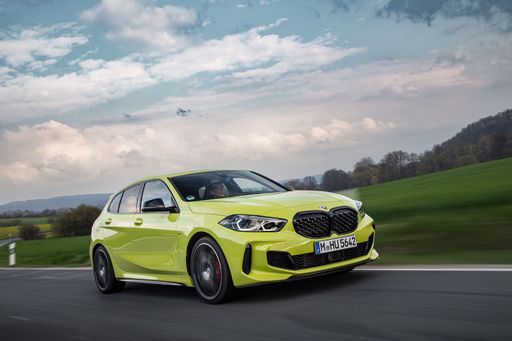 @ press.bmwgroup.com
@ press.bmwgroup.com
BMW 1 Series
BMW 1 Series
The BMW 1 Series stands out with its dynamic design that embodies both elegance and sportiness, making it an attractive choice for urban driving. Its interior offers a premium feel, combining quality materials with the latest in technological features to enhance comfort and connect drivers. Under the bonnet, a range of efficient engines ensures a responsive and enjoyable driving experience, balancing power with practicality.
details @ press.bmwgroup.com
@ press.bmwgroup.com
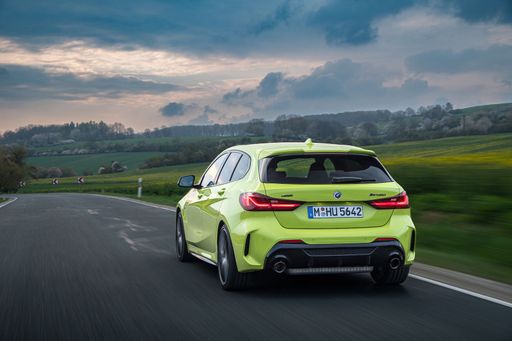 @ press.bmwgroup.com
@ press.bmwgroup.com
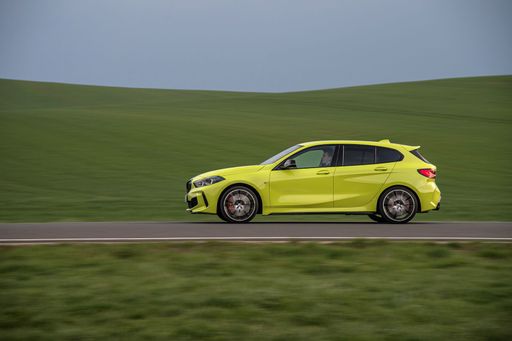 @ press.bmwgroup.com
@ press.bmwgroup.com
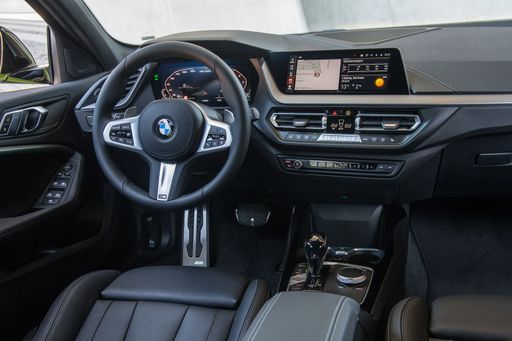 @ press.bmwgroup.com
@ press.bmwgroup.com
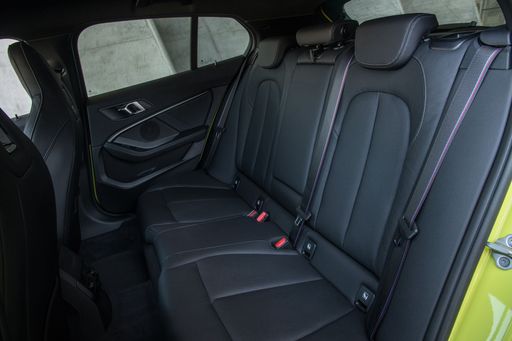 @ press.bmwgroup.com
@ press.bmwgroup.com
Land Rover Range Rover Evoque
The Land Rover Range Rover Evoque combines refined luxury with robust off-road capabilities. Its sleek design and high-quality interior materials create an elegant yet comfortable driving experience. Advanced technology features and superior handling make it a versatile choice for both city and countryside adventures.
details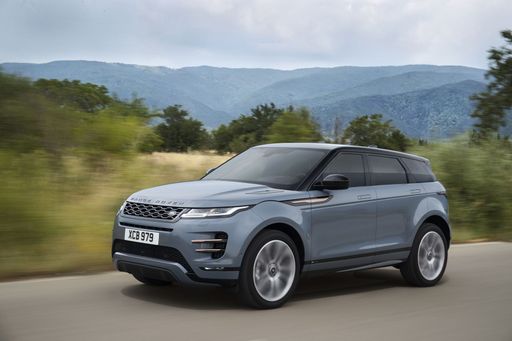 @ media.landrover.com
@ media.landrover.com
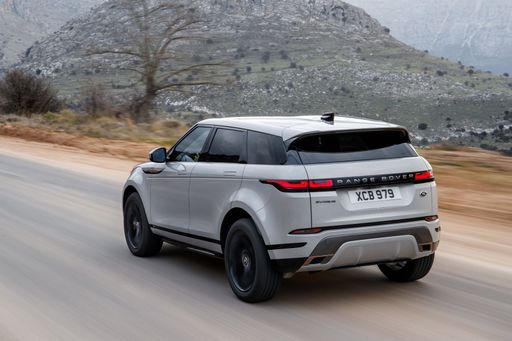 @ media.landrover.com
@ media.landrover.com
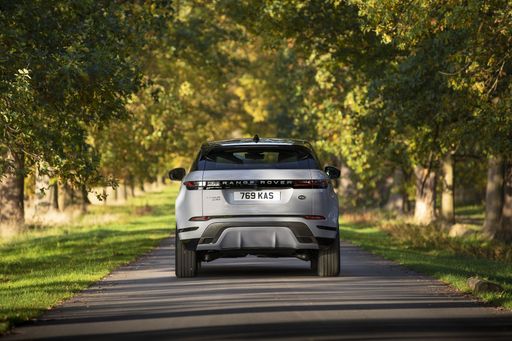 @ media.landrover.com
@ media.landrover.com
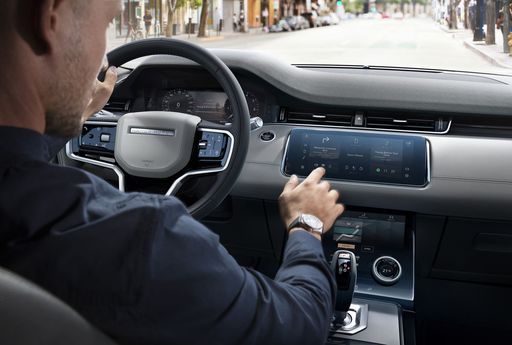 @ media.landrover.com
@ media.landrover.com
 @ press.bmwgroup.com
@ press.bmwgroup.com
|
 @ media.landrover.com
@ media.landrover.com
|
|
|
|
Costs and Consumption |
|
|---|---|
|
Price
28200 - 51100 £
|
Price
43300 - 64800 £
|
|
Consumption L/100km
4.3 - 7.6 L
|
Consumption L/100km
3.7 - 7.8 L
|
|
Consumption kWh/100km
-
|
Consumption kWh/100km
-
|
|
Electric Range
-
|
Electric Range
60 km
|
|
Battery Capacity
-
|
Battery Capacity
11.50 kWh
|
|
co2
112 - 173 g/km
|
co2
85 - 177 g/km
|
|
Fuel tank capacity
49 L
|
Fuel tank capacity
57 - 67 L
|
Dimensions and Body |
|
|---|---|
|
Body Type
Hatchback
|
Body Type
SUV
|
|
Seats
5
|
Seats
5
|
|
Doors
5
|
Doors
5
|
|
Curb weight
1465 - 1625 kg
|
Curb weight
1792 - 2157 kg
|
|
Trunk capacity
300 - 380 L
|
Trunk capacity
472 L
|
|
Length
4361 mm
|
Length
4371 mm
|
|
Width
1800 mm
|
Width
1900 mm
|
|
Height
1459 mm
|
Height
1649 mm
|
|
Max trunk capacity
1135 - 1200 L
|
Max trunk capacity
1156 L
|
|
Payload
475 - 510 kg
|
Payload
503 - 600 kg
|
Engine and Performance |
|
|---|---|
|
Engine Type
Diesel, Petrol MHEV, Diesel MHEV, Petrol
|
Engine Type
Petrol MHEV, Diesel MHEV, Plugin Hybrid
|
|
Transmission
Automatic
|
Transmission
Manuel, Automatic
|
|
Transmission Detail
Dual-Clutch Automatic
|
Transmission Detail
Manual Gearbox, Automatic Gearbox
|
|
Drive Type
Front-Wheel Drive, All-Wheel Drive
|
Drive Type
Front-Wheel Drive, All-Wheel Drive
|
|
Power HP
122 - 300 HP
|
Power HP
160 - 269 HP
|
|
Acceleration 0-100km/h
4.9 - 9.8 s
|
Acceleration 0-100km/h
7.2 - 10.3 s
|
|
Max Speed
210 - 250 km/h
|
Max Speed
190 - 213 km/h
|
|
Torque
230 - 400 Nm
|
Torque
260 - 540 Nm
|
|
Number of Cylinders
3 - 4
|
Number of Cylinders
3 - 4
|
|
Power kW
90 - 221 kW
|
Power kW
118 - 198 kW
|
|
Engine capacity
1499 - 1998 cm3
|
Engine capacity
1498 - 1998 cm3
|
General |
|
|---|---|
|
Model Year
2024
|
Model Year
2025
|
|
CO2 Efficiency Class
D, C, F
|
CO2 Efficiency Class
G, F, B
|
|
Brand
BMW
|
Brand
Land Rover
|
What drive types are available for the BMW 1 Series?
The BMW 1 Series is offered with Front-Wheel Drive or All-Wheel Drive.
The prices and data displayed are estimates based on German list prices and may vary by country. This information is not legally binding.
